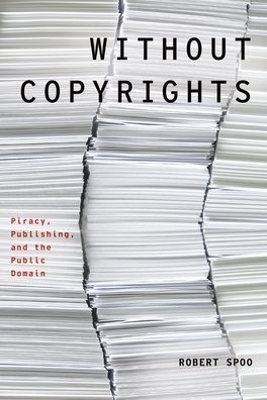
Without Copyrights
Piracy, Publishing, and the Public Domain
Seiten
2016
Oxford University Press Inc (Verlag)
978-0-19-046916-0 (ISBN)
Oxford University Press Inc (Verlag)
978-0-19-046916-0 (ISBN)
Without Copyrights reveals the impact of copyright law on transatlantic modernism in the United States. Key aspects of modernism James Joyce's reputation in America, Ezra Pound's proposals for copyright reform, Samuel Roth's activities as a pirate-pornographer are re-examined in the light of the U.S. law and the voracious public domain it created.
The names of James Joyce and Ezra Pound ring out in the annals of literary modernism, but few recognize the name of Samuel Roth. A brash, business-savvy entrepreneur, Roth made a name--and a profit--for himself as the founding editor and owner of magazines that published selections from foreign writings--especially the risqué parts--without permission. When he reprinted segments of James Joyce's epochal novel Ulysses, the author took him to court.
Without Copyrights tells the story of how the clashes between authors, publishers, and literary "pirates" influenced both American copyright law and literature itself. From its inception in 1790, American copyright law offered no or less-than-perfect protection for works published abroad--to the fury of Charles Dickens, among others, who sometimes received no money from vast sales in the United States. American publishers avoided ruinous competition with each other through "courtesy of the trade," a code of etiquette that gave informal, exclusive rights to the first house to announce plans to issue an uncopyrighted foreign work. The climate of trade courtesy, lawful piracy, and the burdensome rules of American copyright law profoundly affected transatlantic writers in the twentieth century. Drawing on previously unknown legal archives, Robert Spoo recounts efforts by James Joyce, Ezra Pound, Bennett Cerf--the founder of Random House--and others to crush piracy, reform U.S. copyright law, and define the public domain.
Featuring a colorful cast of characters made up of frustrated authors, anxious publishers, and willful pirates, Spoo provides an engaging history of the American public domain, a commons shaped by custom as much as by law, and of piracy's complex role in the culture of creativity.
The names of James Joyce and Ezra Pound ring out in the annals of literary modernism, but few recognize the name of Samuel Roth. A brash, business-savvy entrepreneur, Roth made a name--and a profit--for himself as the founding editor and owner of magazines that published selections from foreign writings--especially the risqué parts--without permission. When he reprinted segments of James Joyce's epochal novel Ulysses, the author took him to court.
Without Copyrights tells the story of how the clashes between authors, publishers, and literary "pirates" influenced both American copyright law and literature itself. From its inception in 1790, American copyright law offered no or less-than-perfect protection for works published abroad--to the fury of Charles Dickens, among others, who sometimes received no money from vast sales in the United States. American publishers avoided ruinous competition with each other through "courtesy of the trade," a code of etiquette that gave informal, exclusive rights to the first house to announce plans to issue an uncopyrighted foreign work. The climate of trade courtesy, lawful piracy, and the burdensome rules of American copyright law profoundly affected transatlantic writers in the twentieth century. Drawing on previously unknown legal archives, Robert Spoo recounts efforts by James Joyce, Ezra Pound, Bennett Cerf--the founder of Random House--and others to crush piracy, reform U.S. copyright law, and define the public domain.
Featuring a colorful cast of characters made up of frustrated authors, anxious publishers, and willful pirates, Spoo provides an engaging history of the American public domain, a commons shaped by custom as much as by law, and of piracy's complex role in the culture of creativity.
Robert Spoo is Chapman Distinguished Chair in Law at the University of Tulsa College of Law.
Introduction
Chapter 1: "The American Public Domain and the Courtesy of the Trade in the Nineteenth Century"
Chapter 2: "Transatlantic Modernism and the American Public Domain."
Chapter 3: "Ezra Pound's Copyright Statute: Perpetual Rights and Unfair Competition with the Dead."
Chapter 4: "James Joyce's Ulysses and American Copyright Protectionism."
Chapter 5: "James Joyce v. Samuel Roth and Two Worlds Publishing Company."
Chapter 6: "The 1934 Random House Ulysses: Copyright and Trade Courtesy.
Epilogue
| Erscheinungsdatum | 08.03.2016 |
|---|---|
| Reihe/Serie | Modernist Literature and Culture |
| Verlagsort | New York |
| Sprache | englisch |
| Maße | 231 x 155 mm |
| Gewicht | 567 g |
| Themenwelt | Geisteswissenschaften ► Geschichte ► Regional- / Ländergeschichte |
| Geisteswissenschaften ► Sprach- / Literaturwissenschaft ► Anglistik / Amerikanistik | |
| Geisteswissenschaften ► Sprach- / Literaturwissenschaft ► Literaturwissenschaft | |
| Recht / Steuern ► EU / Internationales Recht | |
| Recht / Steuern ► Wirtschaftsrecht ► Urheberrecht | |
| ISBN-10 | 0-19-046916-1 / 0190469161 |
| ISBN-13 | 978-0-19-046916-0 / 9780190469160 |
| Zustand | Neuware |
| Haben Sie eine Frage zum Produkt? |
Mehr entdecken
aus dem Bereich
aus dem Bereich
Erinnerungen
Buch | Softcover (2024)
Pantheon (Verlag)
CHF 22,40


